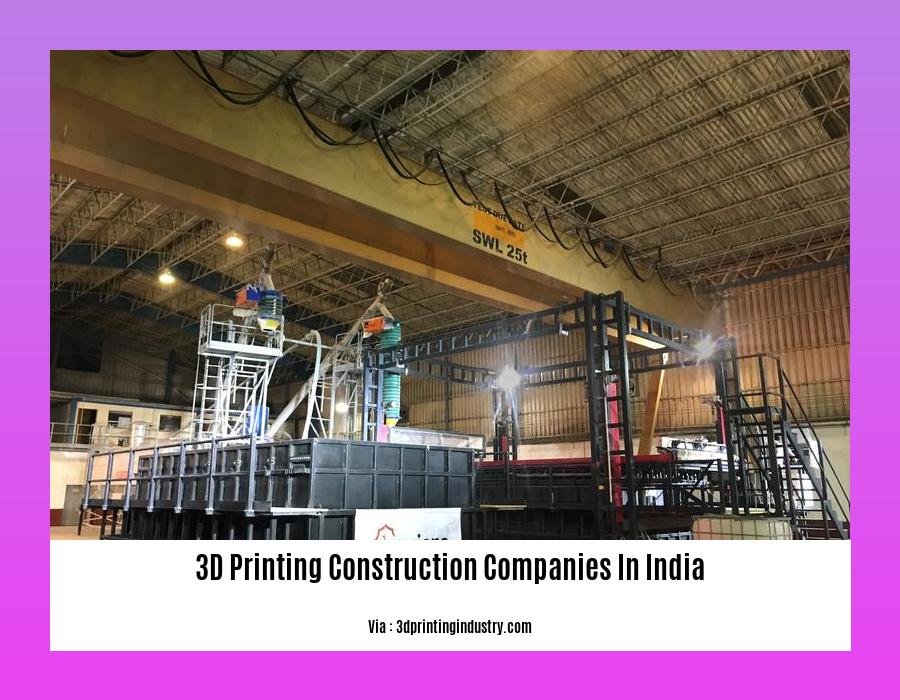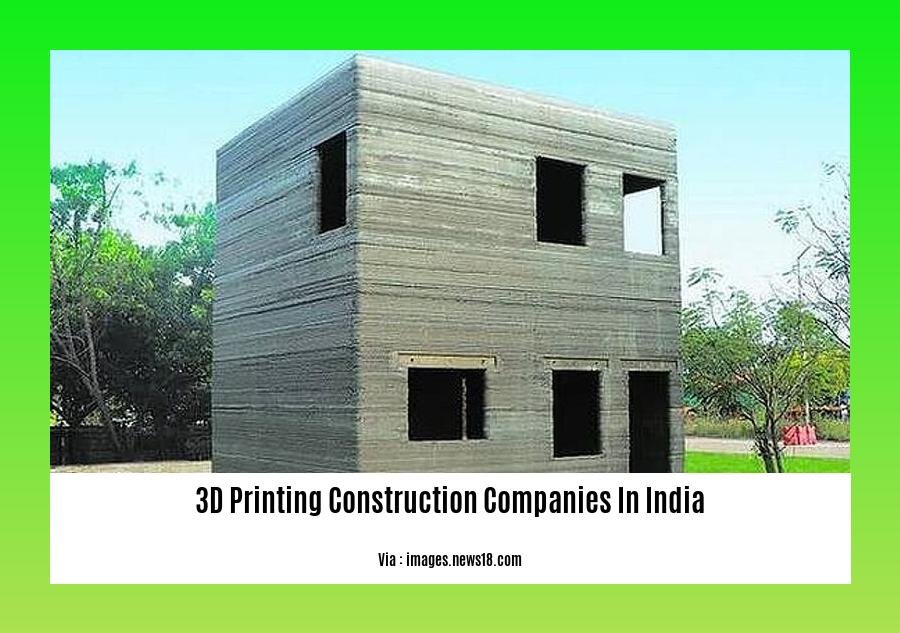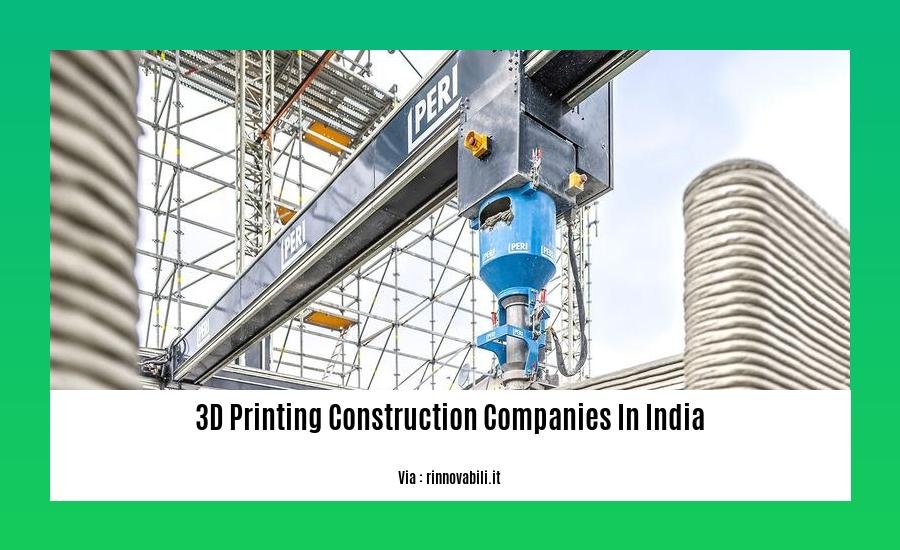In the fast-evolving landscape of the construction industry, India is making remarkable strides with the introduction of 3D printing technology. This revolutionary approach to construction is transforming the sector by offering numerous benefits, including faster project completion, reduced costs, and enhanced design possibilities. This article delves into the rise of 3D printing construction companies in India, exploring their impact and highlighting some leading players in this field. As India embraces this innovative technology, we will uncover how it is revolutionizing the way buildings are constructed, paving the way for a more sustainable and efficient future in the construction industry.
Key Takeaways:
-
L&T Construction, Godrej Construction, and India Cements are established construction companies in India exploring the use of 3D printing technology.
-
Tvasta, Rapid 3D Technologies, and Crenodez Engineering Solutions are startups in India focusing on the development and application of construction 3D printers.
-
Construction 3D printing has the potential to address the need for affordable housing, enhance construction speed and efficiency, reduce labor requirements, improve safety, and enable the creation of complex and innovative structures.
3D Printing Construction Companies in India: Transforming the Construction Landscape


In recent years, 3D printing construction companies in India have emerged as transformative players in the construction industry, revolutionizing traditional methods with advanced technology. These companies leverage innovative 3D printing techniques to construct sustainable, cost-effective, and aesthetically pleasing structures. This article dives into the rise of these companies and explores the impact they are making on the construction landscape in India.
Pioneers of Construction 3D Printing in India:
India has witnessed the rise of several pioneering 3D printing construction companies in India. These companies are at the forefront of innovation, pushing the boundaries of construction technology and transforming the way buildings are designed and built.
-
L&T Construction: A leading construction giant in India, L&T Construction has made significant strides in construction 3D printing. They have successfully completed the construction of India’s first 3D printed two-story building, showcasing the potential of this technology to reshape the industry.
-
Godrej Construction: Godrej Construction, known for its sustainability initiatives, has partnered with Tvasta, a leading manufacturer of construction 3D printers. Together, they have built a concrete 3D printed bus shelter at Godrej’s Mumbai plant, demonstrating the versatility and practicality of 3D printing in real-world applications.
-
India Cements: India Cements, a prominent cement manufacturer, has expressed keen interest in implementing construction 3D printing technology in its operations. This move highlights the growing adoption of 3D printing technology by established construction companies, signaling a shift towards more sustainable and efficient construction practices.
The Potential of Construction 3D Printing in India:
The emergence of 3D printing construction companies in India holds immense potential for transforming the construction sector in the country. This technology offers numerous benefits, including:
-
Cost-Effective Construction: 3D printing technology has the potential to significantly reduce construction costs by eliminating the need for labor-intensive processes and minimizing material wastage. This cost-effectiveness can be a game-changer for affordable housing projects, making them more accessible to the masses.
-
Enhanced Speed and Efficiency: 3D printing construction companies in India can drastically reduce construction timelines by automating the construction process. This improved efficiency enables faster project completion, leading to quicker returns on investment and reduced project delays.
-
Reduced Labor Requirements: 3D printing technology automates many construction processes, reducing the need for extensive manual labor. This not only improves safety on construction sites but also addresses the growing shortage of skilled labor in the industry.
-
Construction Flexibility: 3D printing allows for greater flexibility in design and construction. Complex and intricate structures can be easily fabricated using this technology, opening up new possibilities for architectural innovation.
Challenges and Opportunities in the 3D Printing Construction Sector:
Despite the transformative potential of 3D printing construction companies in India, the industry faces several challenges and opportunities that need to be addressed for widespread adoption:
-
Material Development: The development of durable and cost-effective materials specifically designed for 3D printing in construction is crucial. This will unlock the full potential of this technology and enable the construction of more sustainable and resilient structures.
-
Regulatory Framework: Establishing a comprehensive regulatory framework for 3D printing in construction is essential to ensure the safety and quality of these structures. This framework should address issues such as building codes, liability, and certification, fostering a conducive environment for the growth of this industry.
-
Skill Development and Training: The adoption of 3D printing construction technology requires a skilled workforce trained in operating and maintaining 3D printers. Investing in skill development and training programs will be crucial to bridge the gap between the current workforce and the demands of this emerging industry.
-
Public Awareness and Acceptance: Raising public awareness about the benefits of 3D printing construction and addressing misconceptions can help foster greater acceptance of this technology. Educating stakeholders, including government agencies, architects, engineers, and the public, will be essential for driving demand and promoting the adoption of 3D printing construction practices.
The future of construction in India looks bright with the rise of 3D printing construction companies in India. They are at the forefront of innovation, unlocking new possibilities for sustainable, cost-effective, and efficient construction. By addressing the challenges, leveraging the opportunities, and fostering collaboration, India can position itself as a leader in this transformative technology, revolutionizing the construction landscape and shaping a more sustainable and resilient built environment.
You’ll be astonished to know how economical building a robust 4.5-inch brick wall can be; to learn more, visit 4.5-inch brick wall construction cost. Do you have queries regarding the cost of constructing a 9-inch brick wall in India? Visit the 9-inch brick wall construction cost in India to get the necessary information. To gain insights into the intricate details of AAC block construction, explore AAC block construction details, a comprehensive resource for construction professionals.
Top 3D Printing Construction Companies In India
In India, the construction industry is undergoing a transformative shift, driven by the emergence of 3D printing technology. A new breed of construction companies is harnessing this cutting-edge technology to revolutionize the way buildings are designed, constructed, and printed, unlocking a world of possibilities for innovative, sustainable, and cost-effective construction projects.
Key Takeaways:
- Pioneering Technology: Indian 3D printing construction companies are at the forefront of innovation, pushing the boundaries of technology to create structures that were once thought impossible.
- Sustainable Solutions: 3D printing construction companies in India are committed to sustainable practices, using eco-friendly materials and minimizing waste.
- Creating Opportunities: By embracing 3D printing technology, these companies are generating employment opportunities and upskilling the workforce, fostering a new generation of construction professionals.
The Game-Changers:
Today, there are several leading 3D printing companies in India pushing the boundaries of the industry.
-
Tvasta: Leading the pack, Tvasta, an IIT-Madras alumni startup, has set new benchmarks for the 3D printing construction industry in India. Their expertise in creating complex structures using 3D-printed concrete has gained widespread recognition, showcasing the remarkable potential of this innovative technology.
-
Larsen & Toubro Construction (L&T): A name synonymous with excellence in the construction industry, L&T has taken a bold step into the world of 3D printing. Their successful completion of India’s first 3D printed two-storey building is a testament to their commitment to embracing new technologies and transforming the construction landscape.
-
Carbon Fiber 3D Printers: Research and development in India are pushing the boundaries of construction 3D printing materials. The development of carbon fiber 3D printers offers a unique blend of lightweight, high-strength, and durable properties, opening up new possibilities for innovative and sustainable construction projects.
The Impact of 3D Printing Construction Companies in India:
- Design Freedom: 3D printing construction companies are breaking free from traditional design constraints, opening up a world of architectural possibilities. Complex geometries and intricate structures, once difficult to achieve, are now becoming a reality.
- Cost and Time Efficiency: With 3D printing, construction projects can be completed in significantly less time, leading to reduced costs and improved productivity. The automated and precise nature of the technology eliminates the need for extensive labor, further enhancing cost-effectiveness.
- Sustainable Solutions: 3D printing construction companies are championing sustainable practices, utilizing eco-friendly materials and minimizing waste. The ability to create structures using recycled materials and reduce the carbon footprint of construction projects is a key advantage of this technology.
The emergence of Top 3D Printing Construction Companies In India is revolutionizing the construction industry, paving the way for a more sustainable, efficient, and innovative future. As these companies continue to push the boundaries of technology, the possibilities for transformative construction projects are endless, promising to redefine the skylines of India.
References:
Popular Construction 3D Printing Companies in India (2023)
L&T Construction completes India’s first 3D printed two-storey building
FAQ
Q1: Which Indian company is leading the way in construction 3D printing technology?
A1: Tvasta, an IIT-Madras alumni startup, is India’s leading construction 3D printing company, recognized for its groundbreaking projects and collaborations with reputable clients.
Q2: What significant milestone did Larsen & Toubro Construction (L&T) achieve in 3D printing construction?
A2: L&T, India’s largest construction company, made history by constructing India’s first 3D printed two-storey building, following their successful completion of a one-storey 3D printed house in 2019.
Q3: How can 3D printing technology address India’s need for affordable housing?
A3: 3D printing technology holds the potential to produce cost-effective and sustainable homes, offering a solution to India’s affordable housing needs. It enables faster construction, reduced labor costs, and less material waste.
Q4: What are the advantages of using carbon fiber 3D printers in construction?
A4: Carbon fiber 3D printers, currently under development in India, offer unique advantages in construction. They produce lightweight, high-strength, and durable construction materials, making them ideal for various applications.
Q5: How does 3D printing technology enhance the safety of construction workers?
A5: By reducing the need for manual labor and automating construction processes, 3D printing technology minimizes the risk of accidents and injuries on construction sites, leading to improved worker safety.
- White On White Kitchen Backsplash: Is It Timeless? - November 20, 2025
- Backsplash Colors for White Cabinets: Find Your Perfect Match - November 19, 2025
- Backsplash Ideas for White Cabinets: Find Your Perfect Style - November 18, 2025










